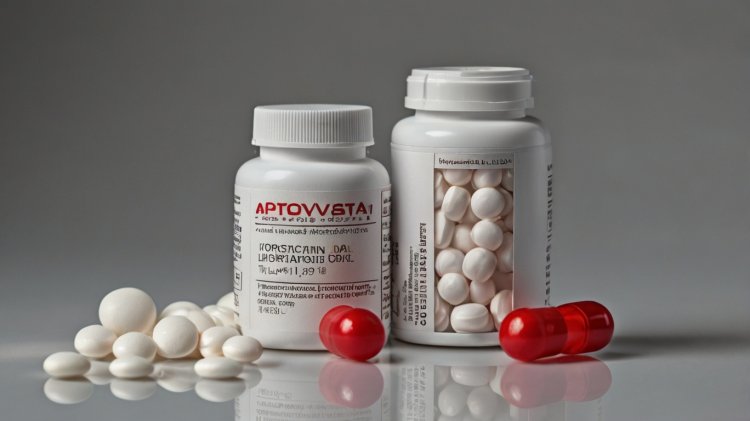Atorvastatin: Interactions, Precautions, and Tips for Safe Use
Learn about Atorvastatin (Lipitor) interactions with medications, alcohol, and supplements. Discover tips to prevent risks and ensure safe usage.

Understanding Atorvastatin Interactions and Precautions
Atorvastatin, commonly sold under the brand name Lipitor, is a prescription medication widely used to manage high cholesterol and reduce the risk of certain heart conditions. While highly effective, atorvastatin can interact with various medications, supplements, and even lifestyle factors like alcohol consumption.
This guide explores atorvastatin interactions, how to manage them, and tips for using the medication safely.
What Is Atorvastatin Used For?
Atorvastatin is prescribed for:
- Lowering high cholesterol levels
- Reducing the risk of heart attack, stroke, and angina
- Managing cholesterol in children with specific conditions
Available as a generic medication and under the brand name Lipitor, atorvastatin belongs to a class of drugs called statins, which work by reducing cholesterol production in the liver.
Potential Interactions with Atorvastatin
1. Medication Interactions
Atorvastatin may interact with several types of medications, leading to increased side effects or reduced effectiveness.
| Drug Type | Examples | Possible Effects |
|---|---|---|
| Antibiotics | Clarithromycin, Erythromycin | Increased risk of muscle pain or damage |
| Antifungals | Itraconazole, Ketoconazole | Increased atorvastatin levels, raising side effects |
| HIV/Hepatitis C Medications | Ritonavir, Glecaprevir/Pibrentasvir | Higher risk of muscle damage and liver issues |
| Fibrates | Fenofibrate, Gemfibrozil | Elevated risk of muscle-related side effects |
| Digoxin | Lanoxin | Increased levels of digoxin, leading to side effects |
If you’re prescribed any of these medications, your doctor may adjust your atorvastatin dosage or monitor you closely for side effects.
2. Alcohol
While atorvastatin doesn’t directly interact with alcohol, both can affect liver function. Drinking alcohol while on atorvastatin may increase your risk of liver damage. Limit alcohol consumption and consult your doctor for personalized advice.
3. Supplements and Herbs
- St. John’s Wort: Can reduce atorvastatin effectiveness by speeding up its breakdown.
- Vitamin D: No clear evidence of interactions, but consult your doctor before combining them.
4. Foods
- Grapefruit and Grapefruit Juice: Grapefruit slows down the enzyme that processes atorvastatin, increasing drug levels and the risk of side effects like muscle pain or weakness. Avoid large amounts of grapefruit products.
5. Cannabis and CBD
Cannabis and CBD products may alter atorvastatin levels, potentially making it less effective or increasing side effects. Share your cannabis use with your doctor before starting atorvastatin.
Health Conditions to Consider
Certain health conditions may increase the risks of atorvastatin side effects:
- Liver Problems: Atorvastatin can worsen liver conditions like cirrhosis or liver failure.
- Kidney Issues: Increases the likelihood of muscle-related side effects.
- Thyroid Disorders: Hypothyroidism raises the risk of muscle damage.
- Diabetes: Atorvastatin may elevate blood sugar levels, requiring close monitoring.
- Pregnancy and Breastfeeding: Atorvastatin is not safe during pregnancy or breastfeeding.
Always share your full medical history with your doctor to determine if atorvastatin is safe for you.
How to Minimize Atorvastatin Interactions
-
Be Transparent About Medications:
Provide your doctor with a complete list of all medications, supplements, and herbs you take. -
Avoid Grapefruit Products:
Steer clear of grapefruit juice and related products to reduce the risk of elevated atorvastatin levels. -
Limit Alcohol:
Minimize alcohol intake to protect your liver while taking atorvastatin. -
Take As Prescribed:
Follow your doctor’s instructions carefully, especially regarding dosage adjustments when combining atorvastatin with other medications. -
Monitor for Side Effects:
Watch for symptoms like muscle pain, weakness, or fever, and report them to your doctor immediately.
FAQs
1. Can I drink alcohol while taking atorvastatin?
It’s best to limit alcohol consumption. Both alcohol and atorvastatin can strain the liver, increasing the risk of liver damage.
2. Why should I avoid grapefruit with atorvastatin?
Grapefruit can slow the enzyme that metabolizes atorvastatin, raising the drug’s levels in your body and increasing side effects.
3. Are there safer alternatives to atorvastatin?
If atorvastatin isn’t suitable for you due to interactions or side effects, your doctor may recommend other statins or cholesterol-lowering medications.
4. How can I tell if atorvastatin is affecting my muscles?
Signs include muscle pain, weakness, or tenderness. Contact your doctor immediately if these symptoms occur.
5. Can I take atorvastatin with other cholesterol medications?
Combining atorvastatin with certain cholesterol medications, like fibrates, can increase muscle-related risks. Your doctor will decide if this combination is safe for you.
Conclusion
Atorvastatin is a highly effective medication for managing cholesterol and reducing heart risks, but it requires careful consideration of potential interactions. By staying informed about the drugs, supplements, and foods to avoid, and by communicating openly with your doctor, you can minimize risks and ensure safe treatment. Always follow your doctor’s recommendations for dosage and lifestyle adjustments to get the most benefit from atorvastatin.










